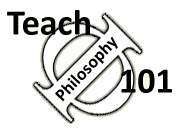Teach Philosophy 101
Free resources for
philosophy teachers!
"One of the most comprehensive, well-researched, and accessible guides for teachers that I have ever seen." James Lang, Chronicle of Higher Education (read full review of TΦ101)
Sample Paper Assignments
Here are a few sample paper assignments, many of which go beyond the traditional philosophical essay. Please send your own examples.
-
Student-produced websites. Our students are fascinated by technology and they are also engaged by doing a project rather than writing traditional academic papers. John Immerwahr and his graduate assistants at Villanova have students work in teams to create websites that grow out of the course material. They use TaskStream, which easily creates professional looking websites. This seems to give students much more interest and pride in the final project (several put links on their Face-book pages or sent the URL to friends and parents). The goal is to take the material and make it accessible to someone who knows nothing about philosophy. Students begin the project by writing an individual paper, then work in teams to synthesize their work, and get class time to do the integration. Immerwahr posts a number of examples on-line and a sample of what an assignment might look like. One goal of this approach is to help students unlearn some of the bad habits they acquire in writing papers for educational institutions. This approach is explained in more detail in the lead article in the Fall 2010 APA Teaching Philosophy Newsletter. Also see the comment about the article from the editors of the newsletter, who apparently think that this approach is a sign of the decline of western civilization.
-
Posters. In the sciences researchers are often expected to produce posters that summarize their research findings. Prof. Kristin Schaupp (University of Wisconsin-Eau Claire) has groups of her philosophy students prepare posters for display to other students in the class. One model is to summarize and analyze a specific article, with some appropriate graphics. Producing a fancy standard sized poster is somewhat expensive, PowerPoint has an option that allows students print the poster on a number of standard-sized sheets of paper that can then be taped together to make a poster. This exercise requires different skills from a standard paper, but it is also easier to grade.
-
Student-produced DVDs. Richard A. Jones (Howard University) has his students produce 20-30 minute DVDs on topics that they are studying in the course. The projects are done by one or two students, and typically involve interviews done by the students. See "The DVD Project for Philosophy Courses," Teaching Philosophy, 32:2 (2009), 113-125.
-
Writing Dialogues. Jonathan Lavery, at Wilfrid Laurier University: Brantford has developed useful materials to help students write philosophical dialogues, instead of essays. He reminds us that the dialogue is, after all, a time-honored philosophical forum, and he believes that having students write dialogues helps them engage with philosophical issues more directly, avoiding some of the writing problems that infect student essays. He also believes that practice with dialogues also helps students write better essays as well. His materials make the approach clear.
-
"Individual-CenteredCollaborative Research." This is an extremely thoughtful and detailed approach to having intro students do collaborative research, created by Nancy Stanlick at the University of Central Florida. The abstract from Teaching Philosophy captures the idea (but you need to read the full article for the details): "A method of assigning, assessing, and utilizing individual-centered collaborative research groups enhances student learning, addresses problems of academic integrity such as plagiarism and free-riding in groups, and incorporates the insights of recent literature on the value of collaboration between and among philosophers and scientists. The method stresses the value of collaborative research while maintaining appropriate focus on individual contributions to avoid problems normally encountered in 'group work.'” The appendix has sample forms. "Individual-centered, Collaborative Research: Method and Theory." Teaching Philosophy, 30.1 (2007):85-110. Michael Strawser has a somewhat similar idea for the design for an entire course.
-
Using games as a prompt for papers. Mark Huston of Schoolcraft College uses some of the games in The Philosophers Magazine. The Battleground God, for example, helps students engage with theological issues. The students play the game and then write a paper responding to the results.
-
"An issue I would die for." In order to understand the thought of Socrates, John Chafee, of Laguardia College, CCNY, asks his students to write a Socratic dialogue on an issue they would die for (link also includes sample essays). From APA Newsletter on Teaching Philosophy, vol 6, no.1 (2006)
-
"Apparently similar but actually different/apparently different but actually similar." A compare/contrast topic that pushes analytic thinking and detailed reading of the text. John Immerwahr, Villanova University.
-
Progressively building on skills. Unlike the paper topic above, which asks students to do the exact same assignment with different texts (hoping that students improve by repeating the same assignment with different texts), here we have three different paper assignments where each builds on the skills learned from the previous one. Sally Scholz, Villanova University.
-
You are There. Penny Weiss (Purdue University) has a viewpoint project with a very simple assignment: "Use an event of your choosing for this paper. Watch or participate in that event as would one of the theorists we read. Then, writing as that theorist, in the first person, describe and analyze the situation. Include quotations from our texts as part of your analysis. The more you can really incorporate and apply of your theorist’s perspective/flavor, the better. Conclude, in your own voice and those of other theorists in the section, with some thoughts about what becomes more and less visible from that theorist’s perspective." For details, see Penny Watson, "Making History of Ideas Classes Relevant." Teaching Philosophy 25:2 (2005), 125.
Author: John Immerwahr
Update: November 8, 2015 (E. Tarver)
